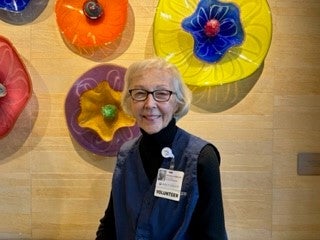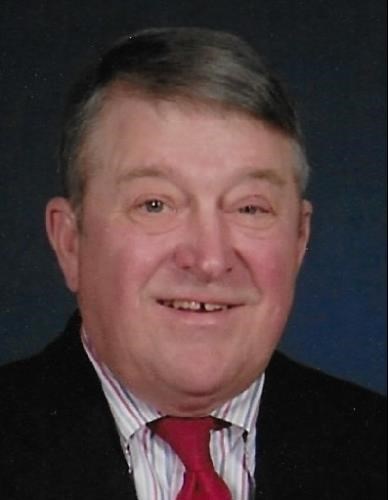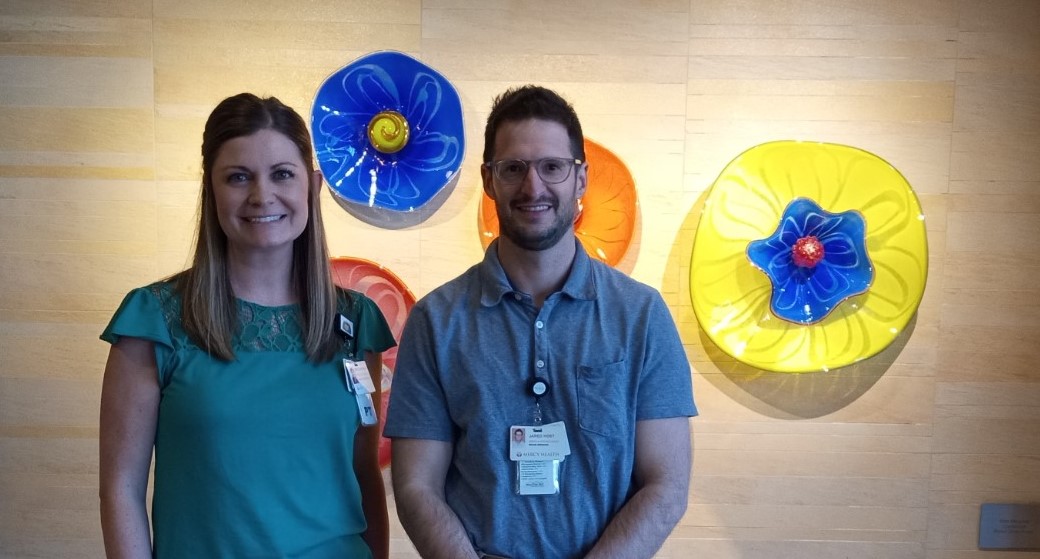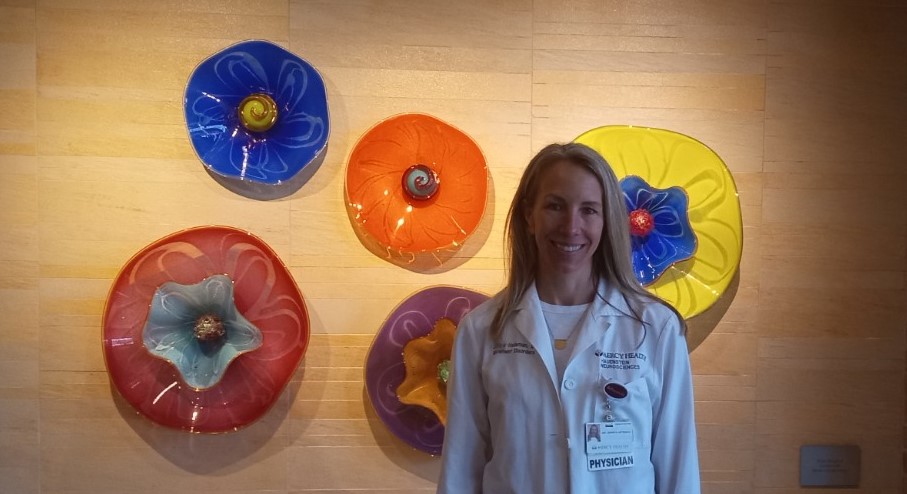Parkinson’s Disease: A Caretaker’s Point of View
April 12, 2023
By: Val Enti
Categories: Behavioral & Mental Health, Neurosciences (Brain Spine, Nerves)
Tags: Parkinson's
If you were to walk into the lobby of the Trinity Health Grand Rapids Hauenstein Neurosciences on a Monday morning, you might meet a delightful lady who has been volunteering at the front desk for the past 13 years. Her name is Patricia Cebelak.
Volunteering is a way for Pat to give back to Trinity Health for the excellent care her husband Richard received at Lacks Cancer Center for his prostate cancer in 2008. “The entire team — from the person who is cleaning your hospital room to the person who is putting in the last stitch — is significant in the role they play in the entire picture of care.”
Pat greets visitors and helps them locate departments and services. The irony is that she began volunteering in the neurosciences building long before her husband became a Parkinson’s patient there in 2015.
Richard and Pat Cebelak had been married 51 years when Richard passed away in June 2021. What follows is their unique story told from Pat’s point of view. The Cebelaks found comfort from their medical team, family, friends, and faith.
The Diagnosis
 In 2015, my husband, Richard, had a regular checkup with his primary care physician. He was 70 years old. His physician noticed that he had tremors in his hands, so he recommended that Richard go to a neurologist with Trinity Health Medical Group in Grand Rapids.
In 2015, my husband, Richard, had a regular checkup with his primary care physician. He was 70 years old. His physician noticed that he had tremors in his hands, so he recommended that Richard go to a neurologist with Trinity Health Medical Group in Grand Rapids.
We felt blessed that Dr. Barbara Pickut, [MD] was Richard’s first neurologist because we were so comfortable in her presence. At the first visit with Dr. Pickut (no longer at Trinity Health), she mentioned Parkinsonism — which refers to several conditions, including Parkinson’s disease — that have similar symptoms.
The tests showed that Richard had Parkinson’s.
Accepting the Diagnosis
Richard and I were both realistic about life and aging. We all must meet physical and medical challenges in our lives. As people of strong faith, we accepted Richard’s diagnosis.
At the beginning, we learned each patient is unique. We never compared Richard’s situation to anyone else’s. We listened to others’ stories, but we had our own story.
At Trinity Health Grand Rapids, there were opportunities for therapy beyond medications. My husband took advantage of what was offered on the campus the entire time. We got so much patient and caregiver help and support from his clinical team. We were blessed.
Get to Know the Clinical Team
Through his first and his second neurologist, Jessica Hedeman, DO, Richard participated in the LSVT BIG and LOUD programs. His physical therapist, Katherine Dabkowski, and voice therapist, Jared Host, introduced Richard to that movement program, and he did these voice exercises at home and was very faithful about it.
Richard saw Dr. Hedeman every six months. He worked with this Parkinson’s team until the day he died. They’re the cream of the crop. They were such encouragers!
Stay Active: Physically and Mentally
 We were already members of the YMCA. Richard exercised there three times a week or walked outdoors independently in nice weather.
We were already members of the YMCA. Richard exercised there three times a week or walked outdoors independently in nice weather.
Once a week, we attended a one-hour exercise group for Parkinson’s patients led by a therapist and a nurse. It was the highlight of Richard’s week! The people in that group were on the same journey. We made friends there … we celebrated birthdays there.
We had so much community until the pandemic shut down the exercise group and the YMCA. I felt the pandemic stole so much from us that could have benefited my husband. We bought an exercise bike so he could stay active at home.
Richard had many interests and kept his mind alert. He loved fishing and fished until the day he died. He was also an avid reader and loved to watch sports. The Michigan Parkinson Foundation offers exercise and movement programs.
Stay Mobile
As the disease progressed, Richard got a special walker designed for Parkinson’s patients (U-Step walker) suggested by Katherine.
In addition to the walker, we purchased a transport wheelchair to use for long-distance walking. It is not like a regular wheelchair operated by the person sitting in it. It is operated by someone assisting the seated patient.
With the wheelchair, we walked in the mall and around the neighborhood, and continued to go to restaurants and church services. We were able to enjoy the Christmas display at Frederik Meijer Garden & Sculpture Park too. We could still have fun! This chair was a godsend.
Stay Informed
We kept abreast of news about Parkinson’s any way we could. We were blessed to have the Van Andel Institute in Grand Rapids. Each year we attended a special event sponsored by the Institute to hear about their Parkinson’s research.
Do anything you can to hold on to hope. Richard knew that he might not be a recipient of a cure but hearing about the research gave him hope. There are also activities and lectures available to Parkinson’s patients through the Parkinson’s Association of West Michigan
Keep Up a Normal Routine, if Possible
 There was never a time when I couldn’t leave Richard alone — which I realize is unique. That gave me the freedom to continue to go to lunch with friends. I could remain active with my church and still volunteer.
There was never a time when I couldn’t leave Richard alone — which I realize is unique. That gave me the freedom to continue to go to lunch with friends. I could remain active with my church and still volunteer.
I was in my 70s, but in good health. I could help Richard with his walker and push him around in his wheelchair. I realize that not everyone is as blessed as I was.
Make Your House User-Friendly
We have a small house that was not user-friendly for people with mobility issues. Do what you can to make life easier for your family member. Put up grab bars so the patient can continue to be mobile. Give your loved one the freedom to do what they want to do for as long as they can.
Accept Help
Friends and family were supportive in so many ways. Richard was able to go fishing in the U.P, with the help of family. Friends from church helped him to ice fish. Priests from our parish also offered ongoing support. Our sons were helpful too.
There is a wall in the Hauenstein building that has information about all sorts of resources for patients and families, including support groups. Because of my nature, I did not inquire about virtual support groups, but I know Trinity Health Grand Rapids has them available.
Keep on Living
Despite Richard’s decline over time, my husband — who was cheerful, positive, and accepting — helped me to remain upbeat. We didn’t let the disease stop us. And we didn’t let it take over our lives. We did the best we could.
Learn more about Trinity Health Michigan’s movement disorders program.
Learn about diagnosing Parkinson's disease.
Learn about treating Parkinson's disease.




